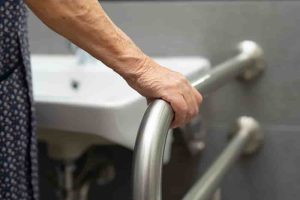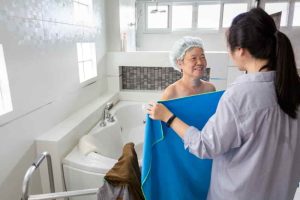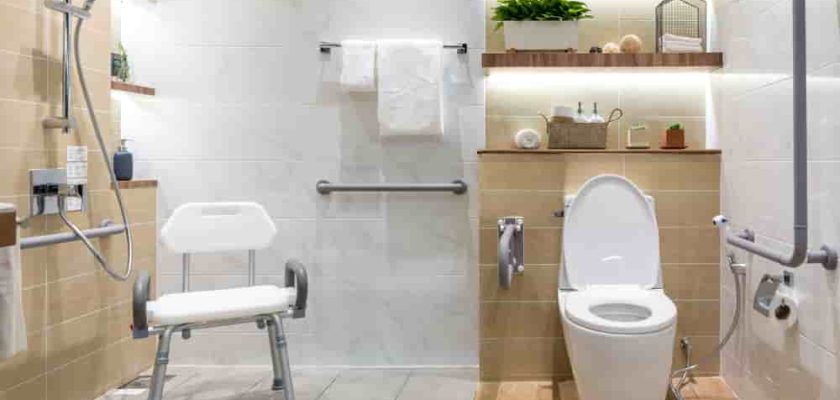Seniors are more prone to physical and psychological vulnerabilities. We must understand that while our age keeps increasing, our physical and mental health somehow affects our willingness. This is what happens to elder people showing signs of tiresome in their daily life activities. There are different forms of shower assistance for elderly older adults to ensure their safe, hygienic, and dignified lifestyle.
This article comprehensively covers bathing assistance for elderly seniors and how they can get help from various organizations and groups. Keep your eyes here, and read the most effective ways to find assistive bathing equipment for older people, bathroom modification, and respite caregiver services.
Shower Assistance For Elderly: Hygienic Care
Contents
We know that older people often suffer from reduced stamina and strength. Due to low energy levels make the physical efforts required to move for the bath challenging and overwhelming, especially when they carry chronic fatigue or have any severe disease or illness. The shower assistance for elderly would bring safety, maintain hygiene, and boost their quality of lifestyle.

Seniors always require assistive support in their household and daily life activities from any of their family members, which often leads to hindrances in the family member’s personal and professional life.
Moreover, conditions like Alzheimer’s or dementia would bring the severity in the elderly’s wiliness to move and cause confusion and fear around bathing. To control these conditions, various bathing services and equipment are designed especially for seniors to help them in the best possible ways.
Over 16% of the total population, or around 56 million people in the United States, are supposedly seniors or older people. According to the U.S Census 2020, 1 in every six people in the country is aged 65 or over; this statistic shows the urgency of elderly care.
The elderly might face several issues during or while taking a bath on their own, significantly when an existing health condition deteriorates or affects them in other ways. The following concerns might initiate the need for shower assistance for Elderly.
- Mobility Concerns and Physical Health Issues
- Existing Diseases, Comorbidities
- Decreased Immunity
- Balancing Issues
- Lack of Concentration
- Cognitive and Sensory Limitations
- Inadequate Access to Bath Tools
- Demotivation due to Social Deprivation
Within your family, if any senior person is living, please ensure the safety of the bathroom they have used in the house. Regularly inspect the loose titles or potential hazards like mold and deteriorating grab bars. The shower area must have non-slip mats or strips that provide enough friction and prevent falls or slips.
See More: Free Government Money For Seniors Over 50
7 Best Bath Equipements for the Seniors
The following assistive equipment could benefit them with their shower experiences by increasing their ability and accessibility and easing their efforts required to take a bath even without any external assistance or support of your family member or caretaker.
- Shower Chairs or Benches
- Bath titles are often slippery and don’t have the proper control to stability with watery exposure. The shower chairs and benches help seniors to sit while taking a bath and reduce the risk of falling and unfortunate accidents that may even result in fatality.
- Handheld Shower Heads
- While seated over the chair or bench, seniors can easily wash themselves with the help of handled shower heads, to the point of sealing their difficulty in accessing the water taps and controllers.
- Non-Slip Mats
- This might be proven the best installment in your bathroom, as it provides the grip and holds against the floor or surface where you stand with your feet. Non-slip mats are usually placed at the bottom of the shower or bath tube, reducing the risk of falls.
- Grab Bars
- This is again the essential tool installed in your bathroom, which can help seniors move in and out by taking hold of these bars. Considering the bathroom space, you can attach them over the walls and other surfaces at your convenience.
- Bath Lifts
- It reduces the risk while moving in and out of the bath tube and assists with your entire body. This would be a great tool to support those seniors with some form of physical disabilities and increases the bathing experiences by pouring out the increased mobility and accessibility with the complete use of the bathtub.
- Shower Caddy
- Hold on, many bathrooms don’t have this, and ignore it for the fact of easiness to carry the bath storage, but when you don’t have a personal bathroom, the caddies play the role of keeping your toothbrush, soaps, and shampoos separately on defined space.
- Waterproof Medical Alert System
- A medical alert system would be beneficial in an emergency, especially when a senior is disabled and showers without constant supervision or human assistance; the alarm system would at least give an immediate message or alert to the other family members; it works as the calling system for the senior person.
The mobility limitations and social distress due to the aged body cause the seniors to seek bathing assistance or support. When they don’t get it, this equipment plays a significant role in their everyday activities.
Different Types of Showers for the Elderly
To ensure safety and reduce risk, the advancement in the bathing industry has continuously evolved. Here you can get the list of different types of shower designs that you might install or construct at your home, considering the given primary elements in accordance with the mobility, safety factors, accessibility, and health conditions of the elderly.
- Walk-in Showers
- Barrier-Free Entry
- Slip-Resistant Floor
- Shower-Tub Combos
- Wet Rooms
- Roll-In Showers
- Trench Drains
- Shower Seats
- Handheld Showerheads
- Grab Bars
- Temperature Controls
- Easy-to-Use Controls
See More: Importance of Free Hospital Beds for the Elderly
Bathing Assistance For Elderly: Benefits and Concerns
Bathing is, although an essential task to maintain the personal hygiene of an individual, for an elderly person, it can be a challenging and potentially dangerous activity. Bathing assistance for elderly can ensure their safety and security, leading to a new way of living by regaining quality and safety.

The mobility, strength, balance, and cognitive functions diminish over time while the aging processes lead to increased dependency on external support, and older adults also tend to lose their self-confidence. The bathing assistance for elderly brings the easinesses in their shower time.
The act of showering or bathing can be intimidating for many older people, and the presence of trusted individuals can give them a sense of security. They also require emotional and psychological support, and bathing assistance for elderly can boost the opportunity to monitor their regular health and wellness.
Respite Caregiver Services For the Elderly
Many local agencies, online directories, or healthcare facilities provide respite caregiver services for older people to rejuvenate their lifestyle with ensured assistance to their bathing cycle. While the primary caretaker of the household can take a break to do their essential work, the other person is outsourced by several platforms to take charge of the assistance of older people.

You can quickly get a shower helper for elderly from respite caregiving service providers. The respite caregivers can reduce the primary caregiver’s burnout period, give them a needed break from their responsibility, and ensure continued care for the care receiver or the elderly in your case.
However, the primary caregiver must coordinate the care receiver’s medication, routines, and preferences well with the respite caregiver to ensure seamless care with the required in-hand information. This can be crucial in the caregiving process and the transfer of the same. The following benefits of respite caregiver services would clarify your ideas related to shower assistance for elderly.
- Reduces Caregiver Burnout
- Maintains Caregiver’s Health
- Enhances Life Quality
- Supports the Care Receiver
- Emergency Preparedness
See More: I Need Help Paying My Rent Today
Explore the following types of respite caregiver services through many platforms to obtain the best elderly shower assistance.
- In-Home Respite Care
- When a professional caregiver comes to your home to provide shower assist for elderly, the safety aspects of the person receiving care increase due to readily available caring resources at the house. This type of respite care enables the elderly to receive care within a familiar environment.
- Adult Day Centers
- Along with shower help for elderly, other homemaking assistance can also be given to older adults, such as meals and essential health services. Although, it is suitable for people with no mobility issues who are somewhat capable of social integration and interactions with coordinators.
- Overnight or Extended Respite
- Care recipients or elderly receivers can stay for several days or weeks in organized respite care facilities or nursing homes where all the care equipment and tools are available to provide basic lifecare services that also include bathing assistance elderly.
- Emergency Respite Care
- This kind of service is available for unforeseen and emergency circumstances where you find an extremely challenging situation that may lead to the fatality of your loved being. Hence, you can get immediate assistance and trustworthy coordination from the respite services provider.
- Informal Respite Care
- We often forget to count this informal care that can be provided by friends, neighbors, or volunteers, but it could play an equal role as the other assistive care programs. However, these kinds of facilities are often based on persuasion and relations and don’t hold any organizational or process service structure.
Bathing assistance for elderly in form of the respite care can ease the extra burden of the family members. At the same time, they can also focus on their personal and professional lives without being guilty of risking their loved ones’ lives. The respite care organizations ensure reliable care and maintain a secure way of living life.
See More: Bed Bath And Beyond Donation Request Apply
Conclusion
The shower assistance for elderly people has been comprehensively discussed along with the 7 best bathing equipment for seniors or older ones. We also have covered the other benefits and concerns associated with the assistive facilities and respite caregiver services and their types which might give you a brief idea about hiring from external care services agencies.
FAQs
You can secure the shower or bathroom space with safety equipment such as long shower heads, shower chairs or batches, grab bars, non-slip mats, bath lifts, shower caddy, and a waterproof alarm system. You can also contact the respite caregiving services agencies nearby your area.
You may require a portable basin or large bowl filled with warm water; get soft sponges or washcloths and ensure the place where you will do it. Bed baths are a good choice for the overweight or disabled elderly person.
The shower surface has a wider friction capability; using the non-slip shower or bathing mats equipped with suction cups to ensure the no-risk of falling would be a great shower choice that can be added with supporting bathing equipment, and tools like a long-tail shower head, grab bars, caddies, or bath lifts.
You must know the elderly person’s physical ability and limitations and who requires external bathing assistance. You can then move to ensure the availability of crucial bath-supporting equipment and assistive tools. If the person receiving the care lacks mobility, please maintain continuous care and support throughout the bathing process.
